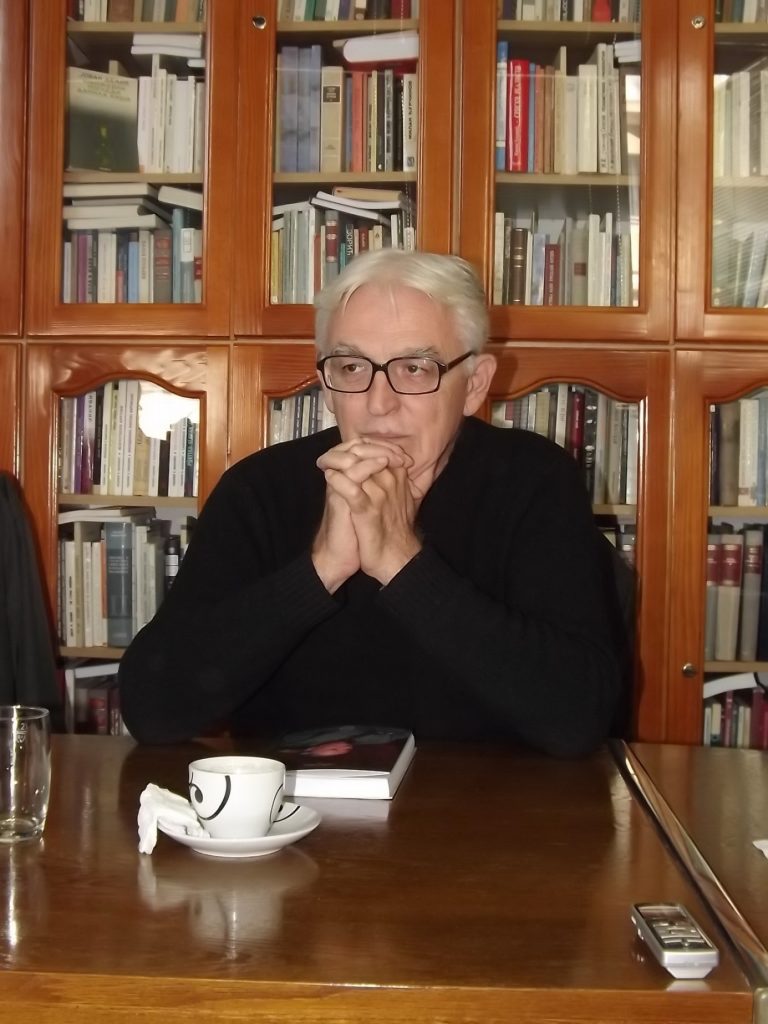ABOUT THE AUTHOR
DRAGO KEKANOVIĆ, a story writer, novelist, poet, playwright and screenplay writer, was born in 1947 in Bratuljevci, near Slavonska Požega.
He received his education in Požega, Osijek and Zagreb (Yugoslav Languages and Literature and Comparative Literature). He has been an editor of Studentski list (Students’ Magazine), Prolog (Prologue) and Polet (Verve); he has edited and prepared a number of forgotten story writers for the Serbian Cultural Society “Prosvjeta” (Education). His longest engagement was as an editor and dramaturge for the ,,Drama Programme” of TV Zagreb and/or Croatian Radio Television.
Kekanović has published the following books: Svjetlost šuma (Light of the Forests, poems, Osijek, 1965), Mehanika noći, spisi (Mechanics of the Night, writings, stories, Zagreb, 1971), Večera na verandi
(Dinner on the Porch, stories, Zagreb, 1975), Ledena šuma i druge kratke priče (The Icy Forest and Other Short Stories, Zagreb, 1975), Potomak sjena (A Descendent of Shadows, novel, Zagreb, 1978), Ivanjska noć (Midsummer Night, novel, Belgrade, 1985), Panonski diptih, dvije pripovijesti (The Pannonian Diptych, Two Stories, Zagreb, 1990), Riblja staza (The Fish Path, novel, Sremski Karlovci, 1997), Američki sladoled (American Ice Cream, novel, Zagreb, 1998, Sremski Karlovci, 1998), Na nebu (In the Sky, stories, Sremski Karlovci, 2002), Veprovo srce (The Boar Heart, novel, Belgrade, 2012, 2013), Usvojenje (The Adoption, novellas, Sremski Karlovci, 2012, 2014), Selected Stories (Sremski Karlovci, 2016).
Besides the dramas Dionis (Dionysus, 1975), Karneval cvrčaka (The Cricket Carnival,
1980) and Esekerski zaljubljenici (Esseker Devotees,1989), Kekanović has authored the screenplays for the films, TV series and TV dramas: Tena (1976), Priče za laku noć (Goodnight Stories, 1978), Hajdučki gaj (Heroic Outlaw’s Grove, 1991), Ispod crte (Below the Line, 2005), Konjanik (A Horseman, 2005), and Lea and Daria (2011).
His stories have been translated into Polish (Zaglada, Cracow, 1985), English, German, Russian, Spanish, Hungarian and Slovenian.
Prizes: ,,Sedam sekretara SKOJ-a”, ,,Oslobođenje”, ,,Politika”, ,,Mladost”, ,,Vladimir Nazor”, ,,Sava Mrkalj”, Vital Book of the Year Award (2013), ,,Borisav Stanković”, ,,Dušan Vasiljev”, ,,Branko Ćopić”, ,,Grigorije Božović”, ,,Danko Nikolić” and ,,Andrić Award”.
He lives in Zagreb.
Drago Kekanović has written a dramatic and painful book managing to merge a personal and collective fate, a personal and collective defeat. The war tragedy has been raised to a symbolic and metaphysical level. The lyrical power of the book and its high symbolic suggestiveness is impressive. The skillfullness in weaving the stories and making twists, together with the narrator’s self-awareness of this skill, is impressive. The mastery of individualization and character modelling is impressive. The distance from the hot national topics and composure in storytelling is impressive. A multiply precious book.
Jovan Delić
But Kekanović is not a writer of a single narrative theme, a single kind of literary characters, a single intonation and meaning. He is, both in his earlier and his later fiction, poetically very rich, dynamic and versatile.
Marko Nedić
Shifting the attention from the expected, in the manner of a great writer, through a symbolic perspective, (…) he has given a meaning to the suffering of those who have lost everything, but are still trying to maintain self-esteem and understanding of the human situation in the sounds of a friendly language and its search for the meaning of life.
Jovan Zivlak
He causes the reader obsessed with the propriety of one world to feel disgust over hunting, in order to show him that his disgust is nothing but a sly grimace over history from which he wants to be exempt and released of the burden of responsibility.
Vladimir Gvozden
In the lives of many Kekanović’ heroes – exiled from their homeland, deprived of the main supports and led by the destiny which has denied them everything – memories and talking about what used to be and no longer is, become the only stronghold of life. From this point of view, parallel with talking about human destinies, Kekanović constantly tells us about the story and storytelling.
Aleksandar Jovanović
A writer, too, can be a chronicler of dramatic events of immediate reality, a profound interpreter of his time.
Mileta Aćimović Ivkov
